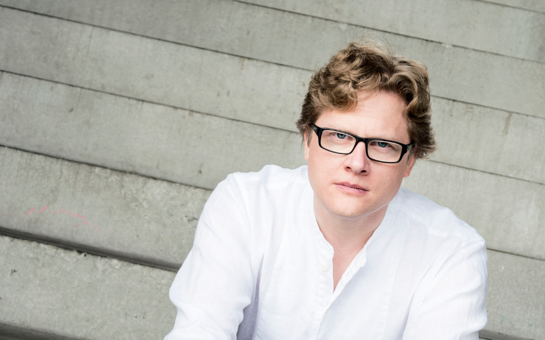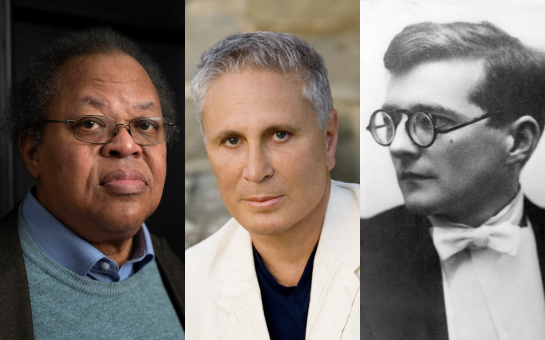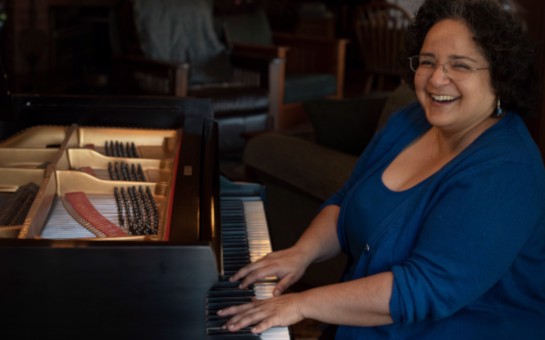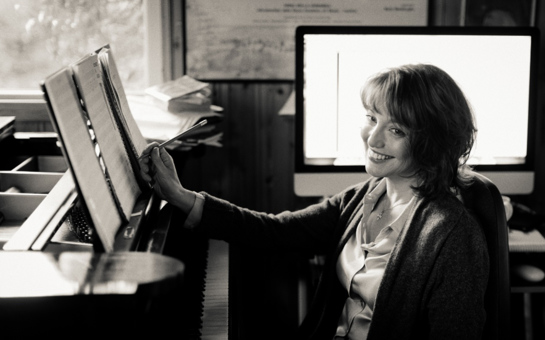Novello & Company Ltd is sad to announce that the composer, writer and pianist Peter Dickinson passed away on Friday June 16 2023, following a short time in hospital with serious illness. He was 88.
Dickinson combined numerous parallel careers in a lifetime of extraordinary musical achievement. As a composer, his wide repertoire ranged from his organ, piano and violin concertos to smaller and lighter works. As Professor Emeritus of the Universities of both Keele and London, he taught and inspired many of today’s leading musicians and established specialist expertise in American music among other fields.
His credentials as a performer were evident as an organ scholar at Cambridge University and then most prominently as a pianist with decades of concert and recording credits, concluding with a CD performed and recorded at the age of 86. As an author Dickinson’s musical subjects ranged from Copland, Berkeley, Cage, Barber, Berners, Mayerl and writings on his own music, to regular reviewing for music magazines.
Dickinson was Head of Music at London University’s Institute of United States Studies and was patron or trustee of a large number of performing and academic institutions. In the last two decades of his life a wholly new accomplishment was represented by Dickinson’s chairmanship of the Rainbow Dickinson Trust, a music education charity which gave significant grants to musicians and musical projects under his leadership.
Future performances of his work include his orchestral Suite from ‘The Unicorns’ by the BBC Concert Orchestra at Snape Maltings, Suffolk, on August 23, conducted by Barry Wordsworth.
Howard Friend, former Managing Editor at Novello & Company Ltd, says: “Peter’s death last week came as a shock. If ever there was a remarkable example to us all of restless determination, energy and eternal youthful vigour, even into his late-80s, it was his. I have known him since he was my tutor in the late 1960s at Birmingham University. An urbane and inspiring figure, he was at that time unusually conversant in contemporary music among academics. Already a published composer, he had recently returned from America, introducing us to the varied work of those now far more familiar composers from across the Atlantic, even venturing into the world of jazz. He was also responsible for building up an alternative library of scores, by composers he thought exciting, at the Shakespeare Institute, then also in Birmingham. It is hard to exaggerate his influence on so many of his students over the years.
“He remained a lively presence at Novello right to the end. We are now doubly grateful that he was responsible for so many of his musical works having been recorded. Added to that was an impressive output of books, his unwavering and effective championing of the music of Ives, Berners, Satie, Berkeley and others, a twenty-five year performing partnership with his sister the mezzo Meriel, coupled, of course, with his considerable academic career. Few musicians now can claim command in such a range of activity.”
Roger Wright, Chief Executive of Britten Pears Arts, comments: “I am enormously saddened by the news of the death of Peter Dickinson. He was a force for good in British music as a composer and a pianist, a remarkable fount of knowledge and expertise in English and American music, a good friend and an Aldeburgh resident. We will miss him.”
Peter Dickinson was born on 15 November, 1934 in Lytham St Annes, Lancashire, the son of Frank Dickinson, contact lens pioneer, and Muriel Dickinson. Music was part of his family and social fabric from an early age, fostering the interest and discipline which were to be the foundation of a lifetime’s work. After a short period when his father’s optical work took the family to South Africa, Dickinson attended the Leys School in Cambridge, before going up to Queens' College, Cambridge. After leaving Cambridge, from 1958 to 1961 Dickinson spent three formative years undertaking teaching and freelance work in New York, including a year at the Julliard School of Music, creating a lifelong affinity with American music and musicians.
In 1962 Dickinson’s academic career progressed with a lecturing post in music at the College of St Mark and St John in Chelsea. Here he met Bridget Tomkinson, daughter of the late Lt. Cdr. E.P. Tomkinson, DSO and Bar, RN and Myrtle Tomkinson, who was studying at the nearby Royal College of Music. Peter and Bridget’s happy marriage of nearly six decades began with their wedding on 29 July, 1964, with two sons completing the family (Jasper in 1968, Francis in 1971). Dickinson’s formidable professional energy and Bridget’s support and understanding of his work enabled him to combine a fulfilling family life with academic posts alongside a busy career as a composer and performer. After teaching at Birmingham University, he completed his organ concerto in 1971. He took the Chair as Professor of Music at Keele University in 1974, creating a new department and establishing the Centre of American Music. Dickinson’s personal connections with figures such as Aaron Copland, John Cage, Lennox Berkeley, Andrzej Panufnik, Jonathan Harvey and Gordon Crosse, and his active role on both sides of the Atlantic in the scholarly promotion and understanding of composers such as Charles Ives, enabled the department to flourish; at the same time he completed his Piano Concerto (1984).
He also performed as a solo pianist as well as accompanying his sister, the mezzo soprano Meriel Dickinson, in a wide and highly original range of concerts, BBC broadcasts and commercial recordings. Their rich partnership encompassed many international performances including composers such as Erik Satie, George Gershwin and a host of commissioned contemporaries. Dickinson’s settings of the work of leading poets led to collaborations with figures such as W. H. Auden, Philip Larkin and John Heath Stubbs.
From 1984, when he left Keele, Dickinson had an intense period of creative work which included composing his Violin Concerto among other works. His unique style - challenging and approachable - was summarised by the BBC Proms: “Conflicts, juxtapositions, attempted syntheses – Peter Dickinson’s work is full of them, all shook-up, all mixed-up, all jazzed up…yet always keenly imagined and meticulously reasoned and realised.”
He took up the Chair of Music at Goldsmiths College, London University in 1991, occupying it until 1997. During this period, he combined teaching with a significant contribution to musical life in London and academic life nationwide, as a board member of Trinity College of Music, the Royal Society of Musicians, the London University Institute of United States Studies, and a range of choirs and trusts. He twice chaired the Music Panel of the Research Assessment Exercise. He was an honorary FTCM and received an honorary DMus from Keele University in 1999.
Dickinson’s professional industry and drive meant that in place of retirement he relished the development of new aspects to his career. As an author he drew on his close friendship with Sir Lennox Berkeley and other internationally important composers to write valuable books setting out unique perspectives. The Music of Lennox Berkeley was the most acclaimed of these works, and insights on figures such as Aaron Copland, John Cage and Samuel Barber were followed by a book on his own work, Words and Music, published in 2016. Dickinson also played a prominent role as a reviewer and writer for Music and Letters, the Gramophone and other music media.
In the late 1990s Dickinson worked closely with his friend the musicologist Bernarr Rainbow to establish a trust in Rainbow’s name to support music education. Under Dickinson’s chairmanship and direction, the trust supported hundreds of orchestras, choirs, festivals and community groups with grants and advice over more than 20 years. The Rainbow Dickinson Trust will continue to support music education including projects of key significance to its two founders. In 2021 Dickinson completed Lockdown Blues, the last of hundreds of successful piano performances and recordings on his part.
Peter Dickinson showed great courage and commitment in charting a unique course in a very long musical career of immensely varied achievement. He was a generous teacher and mentor, and his musical intellect and high standards were mellowed with a positive outlook and sense of humour which will be much missed along with his dynamic contributions to so many aspects of musical life. He was much loved by his family, and is survived by his wife Bridget, two sons and grandson.
Professor Peter Dickinson, a versatile and talented composer and elder statesman in the world of music
(15 November, 1934-16 June, 2023)
Enquiries to Kate Johnson
kate.johnson@wisemusic.com





